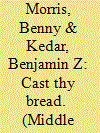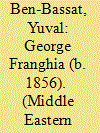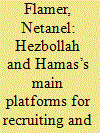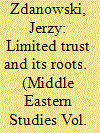|
|
|
Sort Order |
|
|
|
Items / Page
|
|
|
|
|
|
|
| Srl | Item |
| 1 |
ID:
192254


|
|
|
|
|
| Summary/Abstract |
The present article addresses British efforts at using English Language Teaching (ELT) to bolster its position among a broad range of Gulf residents, from sheikhs to students. During a time in which the British image in the Arab world was often discredited, policymakers believed that the English language was one commodity capable of overcoming prevailing negative attitudes. Through an analysis of British Council files for the Persian Gulf, this article examines the successes and failures which attended British efforts to use English language expertise to forge new contacts and to develop a new role in Kuwait, Bahrain and Qatar. It shows that there was rising demand for ELT across the trio of states. In Qatar and, especially, Bahrain, this demand helped Britain to enhance its presence within the education sector and thus help to maintain a form of British involvement in the years following withdrawal. Kuwait proved a more difficult nut to crack; but even here, a revamped ELT effort from 1969 gave British observers encouragement that the English language was among the country’s trump cards in its effort to maintain favourable relations with its former client.
|
|
|
|
|
|
|
|
|
|
|
|
|
|
|
|
| 2 |
ID:
192253


|
|
|
|
|
| Summary/Abstract |
This article describes Israel's bacteriological warfare campaign during the first Arab-Israeli war of 1948. Over the decades following that war rumours circulated that Israel had used bacteria, alongside conventional weaponry, in its battle against Palestine's Arabs and the surrounding Arab states. The declassification of files in the Israeli military archives, our discovery of a crucial letter in private hands, and the publication of a handful of memoirs relating to 1948 have enabled us to bridge the divide between rumour and fact; to explain the campaign's origins; to reconstruct its stages, beginning in April 1948; to identify who was involved – including Israel's prime minister, David Ben-Gurion and the Israeli army's de facto chief of general staff, Yigael Yadin, as well as leading Israeli scientists – and who actively opposed it; and to delineate and assess what the campaign actually achieved or failed to achieve. In sum, this study helps to understand various aspects of the 1948 War.
|
|
|
|
|
|
|
|
|
|
|
|
|
|
|
|
| 3 |
ID:
192250


|
|
|
|
|
| Summary/Abstract |
This article traces the career of the Greek Orthodox Ottoman engineer George Franghia, who served for a decade and a half at the end of the nineteenth century as the engineer of the District of Jerusalem. Franghia, a brilliant and prolific engineer whose name has almost entirely disappeared from the annals of Late Ottoman Jerusalem, was responsible for numerous infrastructure projects, construction plans, and an ambitious vision for modernization which would have completely changed the nature of the city and District of Jerusalem had they been fully implemented. It presents his achievements, and the vicissitudes of his lengthy career, which eventually led him to serve the central Ottoman authorities in Istanbul including the Sultan himself, despite being involved in numerous other initiatives in Jerusalem, both private and public.
|
|
|
|
|
|
|
|
|
|
|
|
|
|
|
|
| 4 |
ID:
192258


|
|
|
|
|
| Summary/Abstract |
Like any military power, violent non-state actors operate intelligence, including human intelligence (HUMINT), to suit their needs. The article aims to explore the primary methods used by Hezbollah and Hamas in recruiting and handling human sources since the mid-2000s, illustrating each method with several case studies. An examination of these methods may shed light on a significant aspect of the intelligence war waged by Hezbollah and Hamas against Israel. In addition, analysis of these organizations’ HUMINT activity demonstrates how violent non-state actors, which are inherently the weaker side in their asymmetric warfare against advanced state entities, can compensate for their disadvantages and conduct effective intelligence activity. The article reveals how the clever and creative use of HUMINT maximizes its benefits for violent non-state actors.
|
|
|
|
|
|
|
|
|
|
|
|
|
|
|
|
| 5 |
ID:
192252


|
|
|
|
|
| Summary/Abstract |
In 1914–1918, 294,000 indigenous people were mobilized in North Africa and sent to the European front. Nearly 45,000 of them were killed or missing in action. This article examines the attitude of the French toward their North African soldiers and tries to explain why in the face of copious evidence of North African loyalty, the appreciation of courage and sacrifice in the fight against Germany was accompanied by suspicion and uncertainty about total loyalty. The article draws attention to the equal sacrifice belief in French thinking about the participation of colonial people in the war. It maintains that opposition to this belief, combined with the manifestations of soldiers’ identity, and the paternalism and racism on the part of the French authorities, created the limited trust of French officials in North African Muslim soldiers.
|
|
|
|
|
|
|
|
|
|
|
|
|
|
|
|
| 6 |
ID:
192255


|
|
|
|
|
| Summary/Abstract |
This article deals with the observation of the activities of West Germans in the Middle East by the West German intelligence organizations Org. Gehlen (under US tutelage until 1956) and the Bundesnachrichtendienst/ BND (under German Federal jurisdiction thereafter) between the late 1940s and late 1960s. It is largely based on hitherto unpublished primary sources from the BND archive, to which the author had access as member of the officially appointed Independent Commission of Historians for the History of the BND (‘Unabhängige Historikerkommission’ or UHK). It argues that the Org. Gehlen/ the BND performed well. It furnished its employers with accurate information and insightful interpretations in the complicated field of Middle Eastern politics in the first quarter century after de-colonization. It also demonstrates how the Federal Government did not necessarily follow the BND’s recommendations, particularly with regard to its policy towards Israel. In this aspect the BND serves as an example of the strengths and weaknesses of intelligence services per se.
|
|
|
|
|
|
|
|
|
|
|
|
|
|
|
|
| 7 |
ID:
192249


|
|
|
|
|
| Summary/Abstract |
This article deals with the overthrow of the Kamil Pasha government, the second government formed after the promulgation of the Constitution, which led the country to elections. Immediately after the promulgation of the Constitution, the political circles of the Ottoman Empire drew an image of harmony and unity, but soon the parties began to part ways. As the main catalyzer of the promulgation, the CUP’s initiative to be active in Ottoman politics and the state administration sparked a period of dispute between them and Kamil Pasha. Kamil Pasha, who was becoming increasingly close to the Ahrar – the opposition party formed during this period – made a cabinet reshuffle on 10 February 1909 which was strongly opposed by the CUP. Members of the CUP disapproved of the revision and overthrew the government through a motion of no confidence in Parliament. This study analyzes these events and the viewpoints of the parties by investigating the Ottoman Archive documents, memoirs, and the press of the period.
|
|
|
|
|
|
|
|
|
|
|
|
|
|
|
|
| 8 |
ID:
192257


|
|
|
|
|
| Summary/Abstract |
The present study examines relations between Iran and the United States as reflected in the historic athletic encounter between the two in the 1998 World Cup games. It describes how each party viewed the game and the opportunities it offered: did it indeed offer a chance at thawing the relations between Tehran and Washington, as the Americans thought? Or did the match serve as an arena of ‘mimic warfare’, as it was perceived by many Iranians, who saw in it an opportunity to avenge themselves on America and demonstrate their superiority? The second part of the article will discuss the effect which the football match of 1998, and even more so that of 2000, had on the Iranian American community in the United States. It will also examine American attempts to leverage these two encounters to create more athletic meets between the two countries. We begin with a background survey of relations between the two countries.
|
|
|
|
|
|
|
|
|
|
|
|
|
|
|
|
| 9 |
ID:
192251


|
|
|
|
|
| Summary/Abstract |
In March 1911, representatives of the Coptic Christian community convened in Asyut in Upper Egypt to discuss perceived grievances hindering Coptic equality with the Muslim majority. Given the apparent peculiarity of the event, it has become customary to situate the 1911 Coptic congress within the context of a rapidly escalating sectarian strife in colonial Egypt following the appointment and assassination of the first Coptic prime minister, Butrus Ghali (1908–1910). Departing from this view, this article proposes to examine the Asyut congress against the backdrop of the development of the Coptic Communal Council ( al-majlis al-milli ) and the ensuing conflict between the lay reformists and the high clergy crystallizing at the end of the century. This study argues that the 1911 congress constitutes a link in the chain of the development of the Communal Council movement that aimed at expanding the purview and jurisdiction of the Council beyond the boundaries of the Coptic Orthodox community ( taʾifa ) to encompass all Egyptian Christians across geographical and denominational lines.
|
|
|
|
|
|
|
|
|
|
|
|
|
|
|
|
| 10 |
ID:
192256


|
|
|
|
|
| Summary/Abstract |
Iran’s 1979 Revolution was accomplished with the participation of a wide range of actors and social groups, with a wide range of motivations and visions for the future. How did the revolution become an ‘Islamic’ revolution? This article revisits the Islamic Republican Party’s print publications in the formative period of the Islamic Republic (1979-81) to explore one element of this process: the ideological framing of Marxist competitors. In the pages of Jumhuri Islami and other semi-official publications, they framed the Feda’in and Mojahedin as ‘ sharqzade ’ (‘eastoxicated’) counterparts to the Shah’s ‘ gharbzade ’ (‘westoxicated’) regime. Authors used two main discursive strategies: painting Marxist groups as possessing an eclectic, materialist ideology at odds with Iranian culture, and as modern counterparts to the ‘hypocrites’ ( monafeqin ) who opportunistically turned against the Prophet Mohammad in Medina. Revolutions are processes, with social groups forming and mobilizing resources to shape their outcomes. Historicizing the ‘Islamic’ nature of the revolution as part of the revolutionary process remains critical for debates over its meanings and legacies more than forty years later.
|
|
|
|
|
|
|
|
|
|
|
|
|
|
|
|
|
|
|
|
|